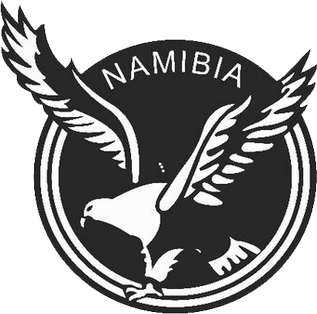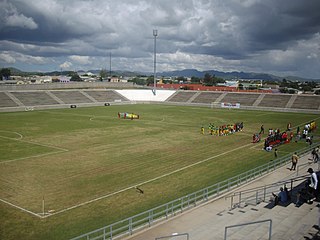
Namibia, officially the Republic of Namibia, is a country in Southern Africa. Its western border is the Atlantic Ocean. It shares land borders with Angola and Zambia to the north, Botswana to the east and South Africa to the east and south. Although it does not border Zimbabwe, less than 200 metres of the Botswanan right bank of the Zambezi River separates the two countries. Its capital and largest city is Windhoek.

Walvis Bay is a city in Namibia and the name of the bay on which it lies. It is the second largest city in Namibia and the largest coastal city in the country. The city covers an area of 29 square kilometres (11 sq mi) of land. The bay is a safe haven for sea vessels because of its natural deep-water harbour, protected by the Pelican Point sand spit, being the only natural harbour of any size along the country's coast. Being rich in plankton and marine life, these waters also draw large numbers of southern right whales, attracting whalers and fishing vessels.

Windhoek is the capital and largest city of Namibia. It is located in central Namibia in the Khomas Highland plateau area, at around 1,700 m (5,600 ft) above sea level, almost exactly at the country's geographical centre. The population of Windhoek, was 486,169 in 2023, is constantly growing due to a continued migration from other regions in Namibia.

The Namibia national football team represents Namibia in men's international football and is controlled by the Namibia Football Association. They have never qualified for the FIFA World Cup but have made four appearances in the Africa Cup of Nations. The team represents both FIFA and Confederation of African Football (CAF).
The Lesotho national football team, also known as LNFT, represents Lesotho in men's international association football and is governed by the Lesotho Football Association.
The Namibian is the largest daily newspaper in Namibia. It is published in English and Oshiwambo.

Sam Nujoma Stadium is a football (soccer) stadium in Katutura, Windhoek, Namibia. The stadium holds 10,300 and was finished in 2005. It is named after the former Namibian president Sam Nujoma.

The Namibia Football Association (NFA) is the governing body of football in Namibia. It was founded in 1990, and affiliated to FIFA and to CAF in 1992. It organizes the national football league and the national team. Its aim is to create a football culture and industry that provides entertainment and economical benefits for all; to become a dominant national association within the confederation via the professionalism of the game's administration; to promote education and development programmes in all aspects of the sport.
Gwen Lister is a Namibian journalist, publisher, anti-apartheid and press freedom activist.
Football in Namibia is governed by the Namibia Football Association. The Namibia Premier Football League is the main domestic league. The Namibia national football team has never qualified for the FIFA World Cup, but has twice been runner up in the COSAFA Cup. They qualified for two Africa Cups of Nations, in 1998 and 2008, being eliminated in the first round both times.

Chief Hosea Katjikururume Komombumbi Kutako, was an early Namibian nationalist leader and a founder member of Namibia's first nationalist party, the South West African National Union (SWANU).

Namibia – United States relations are bilateral relations between Namibia and the United States. Relations were officially established in 1990 upon Namibia gaining independence from apartheid South Africa.

Religion in Namibia is dominated by various branches of Christianity, with more than 90 percent of Namibian citizens identifying themselves as Christian. According to the government's survey, in 2013 up to two-thirds of the country was Protestant, including as much as 44% Lutheran.

The Constitution of Namibia is the supreme law of the Republic of Namibia. Adopted on 9 February 1990, a month prior to Namibia's independence from apartheid South Africa, it was written by an elected constituent assembly.

The Namibia women's national football team is the senior national women's football team of Namibia and is overseen by the Namibia Football Association.

Christianity in Namibia comprises more than 90 percent of the population. The largest Christian group is the Lutheran church, which is split into three churches: The Evangelical Lutheran Church in Namibia (ELCIN), which grew out of the work of the Finnish Evangelical Lutheran Mission which began in 1870 among the Ovambo and Kavango people; the Evangelical Lutheran Church in the Republic of Namibia (ELCRN), which grew out of the work of the Rhenish Missionary Society from Germany which began working in the area in 1842; and the German-speaking Evangelical Lutheran Church in Namibia (ELCIN-GELC). In 2007 the three churches established the United Church Council of the Lutheran Churches in Namibia in an attempt to merge and unify.
The Namibia Women's Super League, also called the FNB Women's Super League for sponsorship reasons, is a semi-professional level women's association football league in Namibia. It is organized by the Namibia Football Association.

The Namibian Economic Freedom Fighters (NEFF) is a political party in Namibia. It was formed in June 2014. The party has close links to the South African Economic Freedom Fighters. Economically, the two parties are similar, with the NEFF describing itself as a pro-freedom, anti-capitalist and anti-imperialist movement, to be against foreign exploitation of the country's natural resources, and proposing that land and its natural resources be owned by indigenous people.
Mass media in Namibia includes radio, television, and online and print formats.
The Namibia national football team represents Namibia in international football under the control of the Namibia Football Association (NFA). After Namibia gained independence, the football association was founded in 1990 and became a member of FIFA and the CAF in 1992. The team played its first official match on 7 June 1990 in Windhoek against Mauritius, resulting in a 1–2 defeat. The match, which was played at the Independence Stadium, also included the nation's first official goal, a 26th-minute strike by Frans Nicodemus.










